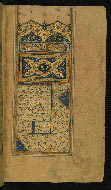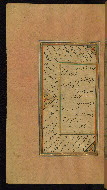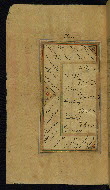Home > Digitized Walters Manuscripts
This document is a tranformation of a TEI P5 XML manuscript description incorporating images. If you have trouble reading special or non-Latin characters on this page, please make sure you have appropriate Unicode fonts installed and an up-to-date web browser.
Walters Ms. W.643, Three short Sufi works
Browse images (Browse images in a new window) | TEI in XML format
W.643
Three short Sufi works
Vernacular: لوايح
LavāmiʿVernacular: لوامع
Nay nāmahVernacular: ني نامه
Authority name: Jāmī, 1414-1492
As-written name: Nūr al-Dīn ʿAbd al-Raḥmān ibn Aḥmad Jāmī
Name, in vernacular: نور الدين عبد الرحمان بن احمد جامي
Note: Author dates preferred by cataloger: d. 898 AH / 1492 CE
This is an illuminated manuscript comprised of three short works on Sufism by Nūr al-Dīn ʿAbd al-Raḥmān Jāmī (d. 898 AH / 1492 CE), produced in Safavid Iran. The first work is called Lavāyiḥ and consists of a collection of apophthegms. The second work is a commentary on the famous Arabic "Wine poem" (Khamrīyah) by ʿUmar ibn Fāriḍ (d. 632 AH / 1235 CE). The third work is a commentary on the "Song of the flute" from the beginning of the Mas̱navī of Jalāl al-Dīn Rūmī (d. 672 AH / 1273 CE). The manuscript was written in nastaʿlīq script by the well-known Iranian calligrapher Bābā Shāh ibn Sulṭān ʿAlī Iṣfahānī in 999 AH / 1591 CE. There is a note dated to the year 1105 AH / 1694 CE on fol. 1a indicating that the manuscript is made up of two papers: Samarqandī (for the text) and Dawlatābādī (for the margins). There are also seals dating between the eleventh century AH / seventeenth CE and the thirteenth century AH / nineteenth CE.
Rajab 999 AH / 1591 CE
Iran
As-written name: Bābā Shāh ibn Sulṭān ʿAlī Iṣfahānī
Name, in vernacular: بابا شاه بن سلطان علي اصفهاني
Note: For the calligrapher Bābā Shāh ibn Sulṭān ʿAlī Iṣfahānī see Bayānī, Mahdī. Aḥvāl va ās̲ār-i khvushʹnavīsān, Vol 1. (Tehran: Instishārāt-i ʻIlmī, 1363 [1984 or 1985]), no.138.
Book
Sufi
The primary language in this manuscript is Persian. The secondary language of this manuscript is Arabic.
- Transliteration: katabahau al-ʿabd al-mudhnib Bābā Shāh Iṣfahānī
- Comment: Only gives the name of the calligrapher
- Transliteration: tammat hadhā [sic] al-risālah al-sharīfa[h] /1/ mushtamal [sic] ʿalá nikāt laṭīfah /2/ fī tafsīr abyāt maʿnawīyah ʿalá /3/ al-ṣadr al-Mathawī al-Maʿnawī /4/ qaddasa sirruhu al-ʿazīz Jalāl /5/ al-Dīn Muḥammad al-Rūmī ʿalayhi /6/ al-raḥmah wa-al-ghufrān /7/ ʿalá yad al-kātib al-faqīr Bābā Sāh bn Sulṭān /8/ ʿAlī Iṣfahānī /9/ fī shahr Rajab al-murajjab /10/ sanat tisʿ wa-tisʿīn wa-tisʿimi<ʾ>ah /11/ al-hijrīyah al-nabawīyah /12/
- Comment: In Arabic; explains the nature of the work and gives the name of the calligrapher and the date of copying as Rajab 999 AH / 1591 CE
Paper
Rose-tinted laid paper; a note dated 22 Jum. II 1105 AH / 1694 CE states that this codex is made up of two papers: Samarqandī (for the text) and Dawlatābādī (for the margins) (fol. 1a)
Foliation: 56
Earlier foliation in Hindu-Arabic numerals in the middle of the upper margin above the frame
Catchwords: Written obliquely on versos
13.0 cm wide by 22.5 cm high
7.0 cm wide by 13.5 cm high
- Columns: 1
- Ruled lines: 12
- Text consists of two panels within a thick frame: the outer (ḥāshiyah) panel and the inner (matn) panel; the text of Lavāyiḥ is located in the inner panel
- Text begins in right margin
- Ruled lines: 17
- Text (written obliquely) begins in the outer margin within the frame
- Title: Lavāyiḥ
- Author: Jāmī, 1414-1492
- Scribe: Bābā Shāh ibn Sulṭān ʿAlī Iṣfahānī
- Incipit: لا احصى ثناء عليك كيف كل ثناء يعود اليك...
- Hand note: Written in nastaʿlīq script in black with incidentals in gold ink
- Decoration note: Titlepiece with title inscribed in white ink; interlinear gilt decoration; small triangular pieces and a double frame
- Title: Lavāmiʿ
- Author: Jāmī, 1414-1492
- Scribe: Bābā Shāh ibn Sulṭān ʿAlī Iṣfahānī
- Incipit: بسم الله الرحمن الرحيم رب انعمت فزد سبحانه من جميل ليس لوجهه...
- Text note: Title inscribed at the beginning of the text
- Hand note: Written in nastaʿlīq script in black with incidentals in gold ink
- Decoration note: Titlepiece with title inscribed in white ink; interlinear gilt decoration; small triangular pieces and a double frame
- Title: Nay nāmah
- Author: Jāmī, 1414-1492
- Scribe: Bābā Shāh ibn Sulṭān ʿAlī Iṣfahānī
- Incipit: عشق جز نایی وما جز نى نه ايم...
- Hand note: Written in nastaʿlīq script in black with incidentals in gold ink
- Decoration note: Small headpiece on a gilt ground
fol. 1b:

- Title: Incipit page with illuminated titlepiece
- Form: Incipit; titlepiece
- Text: Lavāyiḥ; Lavāmiʿ
- Label: This is an illuminated incipit page bearing a titlepiece inscribed Lavāyiḥ in white tawqīʿ script. In the outer margin is inscribed the text of the second work, Lavāmiʿ.
fol. 37a:

- Title: Colophon
- Form: Colophon
- Text: Lavāyiḥ
- Label: This colophon concludes with the inscription: katabahau al-ʿabd al-mudhnib Bābā Shāh Iṣfahānī.
fol. 55a:

- Title: Colophon
- Form: Colophon
- Label: This colophon explains the nature of the work and gives the name of the calligrapher and the date of copying as Rajab 999 AH / 1591 CE. It reads: tammat hadhā [sic] al-risālah al-sharīfa[h] /1/ mushtamal [sic] ʿalá nikāt laṭīfah /2/ fī tafsīr abyāt maʿnawīyah ʿalá /3/ al-ṣadr al-Mathawī al-Maʿnawī /4/ qaddasa sirruhu al-ʿazīz Jalāl /5/ al-Dīn Muḥammad al-Rūmī ʿalayhi /6/ al-raḥmah wa-al-ghufrān /7/ ʿalá yad al-kātib al-faqīr Bābā Sāh bn Sulṭān /8/ ʿAlī Iṣfahānī /9/ fī shahr Rajab al-murajjab /10/ sanat tisʿ wa-tisʿīn wa-tisʿimi<ʾ>ah /11/ al-hijrīyah al-nabawīyah /12/
The binding is not original.
Dark brown leather (with flap) attached backwards; gold-brushed panel-stamped design; doublures with filigree work on a multi-colored ground of blue, orange, pink, and green
Round seal (in the center) of Allāh Muḥammad ʿAlī, 1030 AH / 1620-1 CE (fol. 1a)
Note dated 22 Jum. II 1105 AH / 1694 CE (fol. 1a)
Square seal with the name Maḥmūd (partially erased) and an inscription with the date 1115 AH / 1703-4 CE (fol. 1a)
Octagonal seal of Ḥusayn Shāh Ghulāmī underneath an inscription giving the date Dhū al-Qaʿdah 1127 AH / 1715 CE (fol. 1a)
Ownership statement of Ḥusayn Qavam [?] Daftar, 1301 AH / 1883-4 (fol. 2a)
Walters Art Museum, 1931, by Henry Walters bequest
Gacek, Adam. Persian Manuscripts in the Libraries of McGill University: Brief Union Catalogue. (Montreal: McGill University Libraries, 2005), no. 127. (Lavāyiḥ)
Gacek, Adam. Persian Manuscripts in the Libraries of McGill University: Brief Union Catalogue. (Montreal: McGill University Libraries, 2005), no. 129. (Lavāmiʿ)
Principal cataloger: Gacek, Adam
Catalogers: Landau, Amy; Smith, Sita
Editor: Bockrath, Diane
Conservators: Jewell, Stephanie; Quandt, Abigail
Contributors: Barrera, Christina; Emery, Doug; Herbert, Lynley; Noel, William; Simpson, Shreve; Tabritha, Ariel; Toth, Michael B.; Valle, Chiara
The Walters Art Museum
Licensed for use under Creative Commons Attribution-NonCommercial-ShareAlike 3.0 Unported Access Rights, http://creativecommons.org/licenses/by-nc-sa/3.0/legalcode. It is requested that copies of any published articles based on the information in this data set be sent to the curator of manuscripts, The Walters Art Museum, 600 North Charles Street, Baltimore MD 21201.